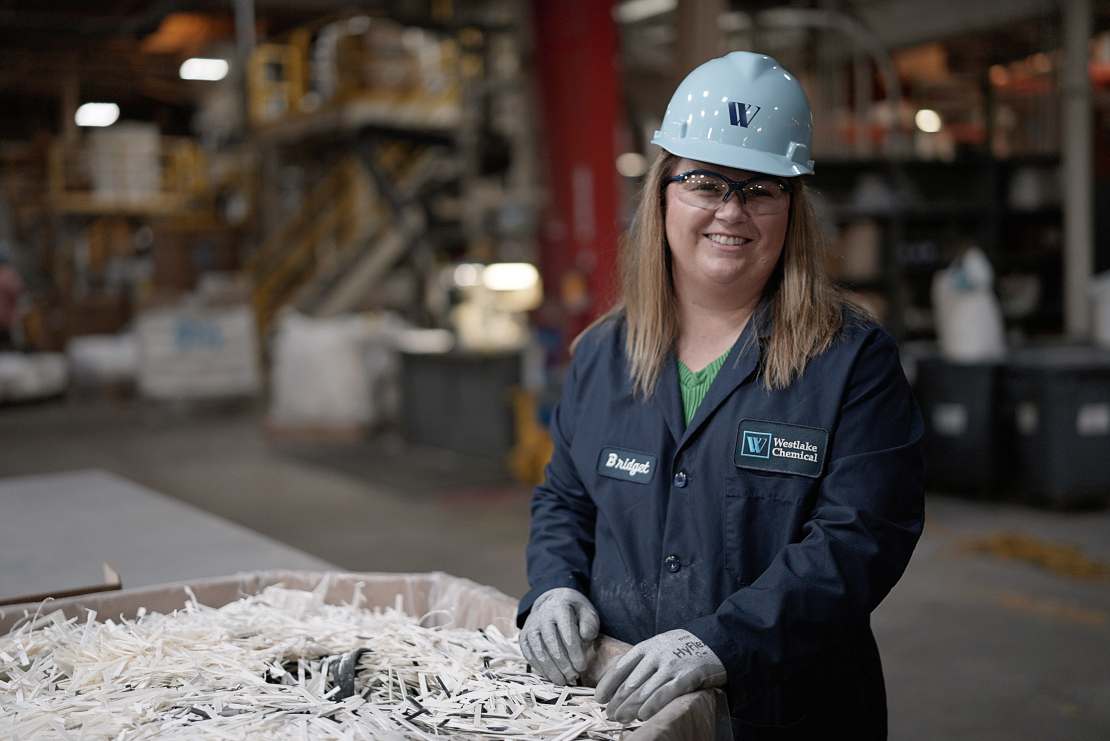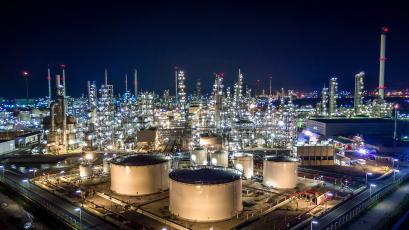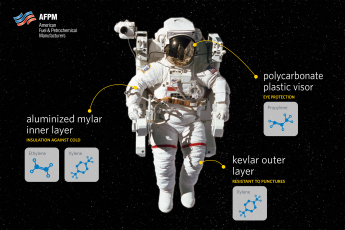Onsite with the Westlake Global Compounds Group in Madison, Mississippi, we watched machines and operators turn chemical inputs into PVC pellets that become many of the products that we use every day — from the pipes that bring water into our homes to vinyl records retro-inclined audiophiles collect for their particular PVC-derived sound quality.

Bridget Confait-Smith is the Associate Director of Research, Innovation, Technology and Global Sustainability with Westlake Corporation.
While there, we spoke with Westlake’s Associate Director of Research, Innovation, Technology and Global Sustainability, Bridget Confait-Smith, whose passion for this work could make anyone excited about polymers and PVC.
AFPM: Before we talk about the exciting things you are doing with PVC resin, can you describe your job?
Bridget: I'm an associate director of research, innovation, technology and global sustainability for our compounds group. The compounds group develops formulations with PVC resin to provide custom solutions with PVC compound in a powder or a pellet that our customers utilize in making their end product.
AFPM: Can you rephrase that for those of us without a degree in Chemistry?
Bridget: Can I tell you how I usually tell high schoolers about my job? I like to describe compounding as being similar to when you go to the grocery store and you buy a box of cake mix. We are what you would consider the cake mix box. So we put most of the ingredients in the box, and then our customers take it home — add eggs and water and then convert it into whatever shape they want, whether that’s square, round or a bundt cake. That's exactly what our customers are doing with the powder or pellets they get from us — they use our ‘mix’ to make their end products.
AFPM: And what are some of those products that we would be familiar with?
Bridget: We can formulate anything rigid or flexible, so there’s a wide variety. It could be electrical boxes or fittings that go into your sink, coating on wiring cables, extension cords, PVC pipes and vinyl records.
AFPM: Vinyl records?
Bridget: Yep, we have a vinyl record formulation! So, we make pellets and those are then converted into what they call “pucks” in the vinyl industry. And what that is really they've melted those pellets down. They press those out and once they harden, they actually have that vinyl record shape and have the sound components that you're used to hearing when you play them.
AFPM: So, the “vinyl” in a vinyl record is PVC? I bet most people don’t know that.
Bridget: Yes, it's very technical but it’s the only material that gives them that particular sound quality. You’ve got old-school vinyl records, right? You would hear that like crackle noise that everybody wants. That wasn't intentional and it was very unique to the polymer.
So, if you changed any of the polymer, you don't hear it, but now they actually are asking us to make sure we have that crackle when we formulate. PVC is really the only material that gives you that really detailed sound quality and also holds structure, because if you think about it, you're constantly putting a needle on it, right?
AFPM: You seem to have a lot of passion for your work – what would you say is the coolest part of your job?
Bridget: For me, it's really the innovation of making plastics that go into really cool end use applications - things that, as a consumer myself, I would need to use every day.
Then considering the plastic that we make, and asking ourselves, how can we formulate that better, smarter, cheaper or more sustainable?
AFPM: What’s an example of where you were able to do that?
Bridget: Sustainability is a major focus for both our company and me personally. We can now make products that weren't traditionally considered recyclable or sustainable.
We've developed products using recycled content that still perform equally well. For instance, PVC, not historically seen as recyclable, shows advantages when recycled content is added. Electrical boxes in your house, for example, gain more rigidity and durability with recycled PVC compared to virgin material.
AFPM: You said that PVC was considered hard to recycle or has been in the past. Why is that?
Bridget: In my opinion, we didn't effectively communicate that PVC could be recycled. Unlike the aluminum industry, which successfully marketed the recyclability of cans, the PVC industry lacked such a campaign. This is partly because PVC isn't used in everyday disposable items, making awareness a challenge.
When demolishing a house, the common practice was to dispose of everything. Now, people are realizing they can salvage PVC items like windows, piping, and decking. These can be ground up and recycled into new products.
AFPM: You had mentioned that Sustainability is personally important to you when it comes to the work you do. Where does that passion for sustainability come from?
Bridget: To put it bluntly, about a decade ago, sustainability was just a buzzword with little follow-through. Now, it's genuinely meaningful and here to stay. This isn't a fleeting trend; it's become impactful enough in the industry and market, with growing understanding and standardization of sustainability programs and initiatives. I truly believe sustainability is here to stay, and we'll see even more of it in the future.
AFPM: And you see these materials as being part of that – moving toward a more sustainable world?
Bridget: Yes, I do, because it checks all the boxes: low greenhouse gas emissions, recyclability, and potential for bio-attributed aspects. We need to improve marketing and education to help people understand that PVC is much more than just plastic.
AFPM: I'm an average person or consumer, if you could only share one message with me about your work, what would be the most important thing that you would want me to remember or to take away?
Bridget: It's just that plastics aren't bad.
There's actually a lot that plastics do and contribute to many advantages in your life. And PVC specifically is one that is incredibly versatile. Its use ranges from medical devices used in hospitals to everyday home items like water pipes, showers, windows, and decking. PVC truly impacts every aspect of your life.
Plastics are touching you and there's a lot of thought and intention and innovation and development put behind what you're seeing in that final product.


